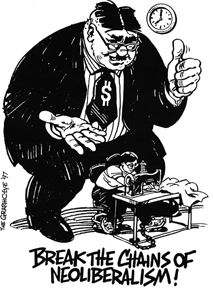Joe
Registered
- Joined
- Oct 18, 2007
- Messages
- 2,694
- Likes
- 3,113
Many newcomers to Argentina and LatAm may be unfamiliar with the term "Neo-Liberal". In North America, the closest corresponding term, IMO, is "Libertarian". Since they both derive from the word "Liberty" I think it is a good comparison.
Neo-Liberalism advocates a free-market approach to the economy whilst reducing government involvement.
A Neo-Liberal has become a perjorative term in LatAm used by the Left to criticize the Right much like the word "Liberal" in North America is a perjorative term used by the Right to criticize the Left. So remember, North American "Liberal" and South American "Neo-Liberal" are a TOTALLY DIFFERENT species. There will be a test so don't forget!
Maybe the closest thing to a Neo-Liberal party today is the UKIP party in the UK.
The true Peronist hates the Neo-Liberal with a passion. Neo-Liberalism in Argentina is associated with Menem. This is ironic because the two most important policies of Menem were abhorent to free market advocates:
1) a fixed exchange rate "see Convertibilidad"
2) a corrupt privatization policy designed to enrich Menem Cronies
While Neo-Liberalism favors Privatization, it favors getting the maximum price to lower government debt and/or reduce taxes to spur the economy. Menem's program did neither. It was just another big government corruption project.
And a Neo-Liberal believes in Free Markets. Neo-Liberalism would NEVER, NEVER favor a fixed exchange rate like the 1 to 1 rate of Menem's Convertibilidad.
Neo-Liberalism advocates a free-market approach to the economy whilst reducing government involvement.
A Neo-Liberal has become a perjorative term in LatAm used by the Left to criticize the Right much like the word "Liberal" in North America is a perjorative term used by the Right to criticize the Left. So remember, North American "Liberal" and South American "Neo-Liberal" are a TOTALLY DIFFERENT species. There will be a test so don't forget!
Maybe the closest thing to a Neo-Liberal party today is the UKIP party in the UK.
The true Peronist hates the Neo-Liberal with a passion. Neo-Liberalism in Argentina is associated with Menem. This is ironic because the two most important policies of Menem were abhorent to free market advocates:
1) a fixed exchange rate "see Convertibilidad"
2) a corrupt privatization policy designed to enrich Menem Cronies
While Neo-Liberalism favors Privatization, it favors getting the maximum price to lower government debt and/or reduce taxes to spur the economy. Menem's program did neither. It was just another big government corruption project.
And a Neo-Liberal believes in Free Markets. Neo-Liberalism would NEVER, NEVER favor a fixed exchange rate like the 1 to 1 rate of Menem's Convertibilidad.

